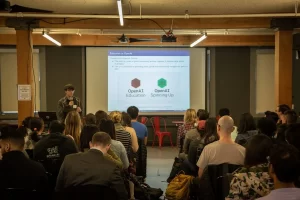SAN FRANCISCO — OpenAI has unveiled its latest initiative, the OpenAI Residency, aimed at cultivating the next generation of AI researchers and engineers. The program represents a significant step in OpenAI’s commitment to nurturing diverse talent within the field of artificial intelligence.
Building on the success of its former Scholars and Fellows programs, the Residency offers a unique opportunity for individuals from non-AI backgrounds to transition into full-time roles at OpenAI. Unlike traditional curriculum-based learning models, Residents will engage in hands-on collaboration with OpenAI’s teams, working on real-world projects to hone their skills in practical AI applications.
“We’re thrilled to introduce the OpenAI Residency as a gateway for talented individuals eager to contribute to AI,” remarked Ilya Sutskever, Chief Scientist at OpenAI. “This program aims to accelerate learning and provide a supportive environment where Residents can make meaningful contributions towards our goal of developing beneficial AI.”
The inaugural cohort of the six-month program commences in April 2022, during which Residents will receive full-time salaries and work alongside seasoned professionals at OpenAI. The initiative is part of OpenAI’s broader strategy to expand its talent pool, welcoming applicants from diverse educational and professional backgrounds, including those traditionally underrepresented in technology.
Sam Altman, CEO of OpenAI, emphasized the program’s inclusivity and its potential to attract unconventional yet promising talent. “We’re looking for curious, passionate individuals who are eager to delve into AI and machine learning,” Altman stated. “Whether you’re a recent graduate, an industry professional, or a self-taught enthusiast, this program offers a platform to innovate and shape the future of AI.”
The Residency program encompasses two distinct tracks: AI Software Engineering, tailored for engineers seeking to specialize in AI applications, and AI Research, designed for researchers transitioning into AI-focused roles. Both tracks aim to leverage participants’ existing skills while equipping them with the necessary tools and mentorship to thrive in AI research and development.
Christina Kim, a former Scholar turned full-time Software Engineer at OpenAI, highlighted the program’s transformative impact on her career. “OpenAI offers a unique opportunity to tackle cutting-edge engineering challenges in AI,” Kim noted. “For anyone passionate about AI research, this environment fosters cross-functional collaboration and continuous learning.”
Christine McLeavey, who transitioned from independent study to managing OpenAI’s Multimodal team through the Residency program, underscored the invaluable support and mentorship she received. “The Residency opened doors for me in AI research,” McLeavey said. “It provided the confidence and resources needed to pursue groundbreaking projects alongside leading researchers at OpenAI.”
Jonathan Ward, another former Scholar and now a Researcher at OpenAI, emphasized the role of mentorship and community in accelerating his research career. “Being part of the Residency program enabled me to delve into complex research questions and contribute meaningfully to OpenAI’s mission,” Ward stated.
In addition to fostering technical expertise, the Residency program offers immigration and relocation assistance to facilitate global participation, ensuring a diverse and inclusive cohort of talent.



















